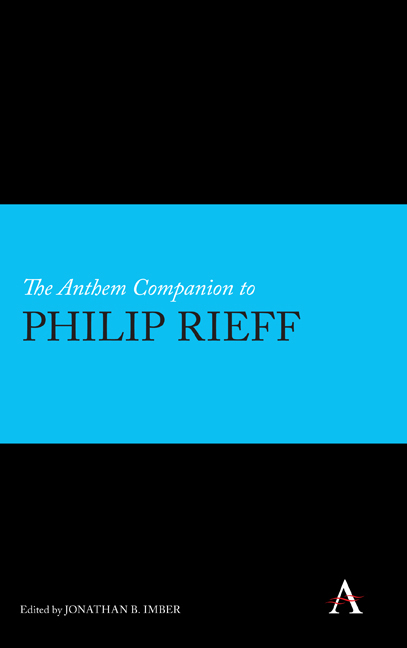Book contents
- Frontmatter
- Contents
- Introduction
- Chapter 1 Philip Rieff: Some Reflections
- Chapter 2 Philip Rieff and the Impossible Culture
- Chapter 3 Philip Rieff as Cultural Critic
- Chapter 4 Philip Rieff as Teacher
- Chapter 5 Prophet v. Stoic: Philip Rieff's Case against Freud
- Chapter 6 Decline and Fall in the Work of Philip Rieff: “I love the old questions” Beckett, Endgame
- Chapter 7 Philip Rieff as Social/ Cultural Theorist
- Chapter 8 Fellow Sons
- Chapter 9 Philip Rieff and Social Theory
- Chapter 10 A Kindly Apocalypse: Philip Rieff and the Endgame of the Therapeutic
- Chapter 11 Disenchantment, Authenticity and Ordinary Charisma
- Writings of Philip Rieff
- List of Contributors
- Index
Chapter 6 - Decline and Fall in the Work of Philip Rieff: “I love the old questions” Beckett, Endgame
Published online by Cambridge University Press: 21 June 2018
- Frontmatter
- Contents
- Introduction
- Chapter 1 Philip Rieff: Some Reflections
- Chapter 2 Philip Rieff and the Impossible Culture
- Chapter 3 Philip Rieff as Cultural Critic
- Chapter 4 Philip Rieff as Teacher
- Chapter 5 Prophet v. Stoic: Philip Rieff's Case against Freud
- Chapter 6 Decline and Fall in the Work of Philip Rieff: “I love the old questions” Beckett, Endgame
- Chapter 7 Philip Rieff as Social/ Cultural Theorist
- Chapter 8 Fellow Sons
- Chapter 9 Philip Rieff and Social Theory
- Chapter 10 A Kindly Apocalypse: Philip Rieff and the Endgame of the Therapeutic
- Chapter 11 Disenchantment, Authenticity and Ordinary Charisma
- Writings of Philip Rieff
- List of Contributors
- Index
Summary
Philip Rieff's (1922– 2006) intellectual and cultural inheritance derives from a variety of sources. For example, he was not a religious Jew and mentions of the Holocaust hardly make an appearance in his early work. Yet increasingly “Auschwitz” takes on great moral and cultural significance in his late writings. Rieff made his intellectual name with an intellectual biography of Sigmund Freud, co- written with his first wife Susan Sontag. It still stands as a major achievement, even if his own attitude toward Freud moved from admiration to disapproval over the years. As a sociologist, Rieff was influenced by Emile Durkheim's emphasis on the relationship between a society's cohesion and its religious ethos, not to mention Max Weber's writings on authority and his idea of modernity as intertwined with secularization, a special preoccupation of modern German thought. The philosophy of culture hammered out by Friedrich Nietzsche was also of fundamental importance for Rieff's later work, particularly, of course, for his “death of God” anti- theology. Besides that Rieff was steeped in the advanced art and culture of the twentieth century. In this he was a product of an eclectic and pluralist modernist culture.
But as a theorist of culture, Rieff was indifferent to the philosophical tradition of Greece as it has shaped modern thought, particularly German thought. There's no evidence that Rieff accepted Martin Heidegger's version of Western thought as Seinsvergessenheit (the forgetting of Being). Though he admired Hannah Arendt as “one of the most trustworthy guides to our time and its past,” he never really responded to her claim that the history of Western political ideas was the story of the loss of authentic political thinking. And unlike another (adopted) American conservative, Leo Strauss, with whom he is sometimes compared, Rieff did not choose Athens over Jerusalem, rationality over revelation, natural law over God's commandments. Unlike both Strauss and Arendt, he was largely dismissive of politics, which he considered to be the pursuit of crass material interests and power grabbing. Still, in his late writings, he identified the Hellenic origins of the West with what he called the “first world,” one founded on “taboo” and guided by “fate.” The third world, which we the living allegedly now inhabit, sees the world in terms of the “primacy of possibility” (aka POP), and it is guided by “rules” that regulate the roles the self continually tries on and sheds.
- Type
- Chapter
- Information
- The Anthem Companion to Philip Rieff , pp. 99 - 116Publisher: Anthem PressPrint publication year: 2018

